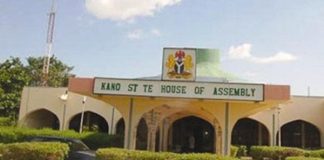🌿 Ruzu Non-Alcoholic Herbal Bitters
Ruzu Non-Alcoholic Herbal Bitters is a natural health supplement specially formulated to:
- ✅ Promote general wellness
- ✅ Detoxify the body
- ✅ Support the treatment of various ailments
Made from a powerful blend of 100% organic and medicinal herbs, Ruzu is completely alcohol-free, making it ideal for:
- 👪 All age groups
- 🌱 Health-conscious individuals
- 🌿 Anyone seeking non-alcoholic herbal remedies
Whether you're looking to boost your vitality, cleanse your system, or support healing the natural way, Ruzu Bitters offers a trusted herbal solution.
Nigerian banks are resuming international transactions on naira-denominated debit cards after years of stringent limitations brought on by dollar shortages and unstable foreign exchange. This is a significant milestone that shows improved trust in the nation’s economy.
One of the clearest indications to date that Governor Olayemi Cardoso’s reforms at the Central Bank of Nigeria (CBN) are effective is this development.
The country’s foreign exchange liquidity has significantly improved as a result of the decision by a number of top banks, notably United Bank for Africa (UBA), FirstBank, Guaranty Trust Bank (GTBank), and Wema Bank, to re-enable worldwide card usage.
It is more than just a financial development; following years of inconsistent policies, two different exchange rates, and a lack of dollars in the official market, it represents a larger move toward economic normalization.
Customers, students, tourists, small companies, and tech-savvy business owners that rely on foreign payments for services, subscriptions, purchases, or business tools may find this to be a welcome relief.
The extended freeze
The usage of naira cards for foreign transactions was restricted by Nigerian banks in 2020.
The global COVID-19 pandemic, oil price shocks, and an increasingly erratic forex management system all contributed to the extreme lack of foreign cash inflows, which in turn precipitated the action.
As reserves decreased and the CBN found it difficult to fulfill its forex commitments, several banks merely stopped allowing dollar access using naira cards. Netflix, Amazon, Spotify, Zoom, and Udemy were among the companies that had to open domiciliary accounts and obtain foreign currency from the unstable and frequently exploitative parallel market in order to pay for products and services overseas.
Other banks eventually stopped all cross-border transactions unless they were financed with real dollar deposits, while others set extremely low spending limitations of as little as $20 to $100 per month. Particularly for computer workers, international students, frequent travelers, and SMEs involved in international trade, this caused a great deal of pain.
An important turning point
With the appointment of Olayemi Cardoso as Governor of the Central Bank of Nigeria by President Bola Tinubu in 2023, things started to change. Restoring the credibility of Nigeria’s monetary policy framework and addressing the dysfunction of the FX market were among Cardoso’s first moves.
In addition to removing distortions by implementing a willing-buyer, willing-seller model and swiftly unifying the several currency rates that had beset the system, Cardoso and his staff also cleared a backlog of more than $7 billion in unpaid FX commitments.
The market and investors received clear signals from these audacious measures that Nigeria was committed to macroeconomic stability, budgetary restraint, and transparency.
An other noteworthy action was the drive to draw in cash from both conventional and unconventional sources. This includes opening up more areas for International Money Transfer Operators (IMTOs), encouraging diaspora remittance routes, enhancing money transfer companies’ access to naira liquidity, and easing restrictions on capital importation.
When combined, these actions improved Nigeria’s net foreign exchange reserve position, which increased from $3.99 billion at the end of 2023 to $23.11 billion by the middle of 2025. Additionally, during the same time period, gross external reserves increased from $33.22 billion to $40.19 billion.
For use abroad, banks reactivate Naira cards.
As dollar liquidity improved and the naira gained relative stability in the official window, Nigerian banks started to allow naira debit cards to be used internationally again.
Several large banks formally announced the removal of limitations in May and June of 2025.
In a client message, UBA stated: “International transactions are now possible with all UBA Premium Naira Cards, including Gold, Platinum, and World versions. This implies that using your card for regular payments, internet shopping, point-of-sale, and ATM transactions worldwide is simple and adaptable.
“Your Wema Naira Mastercard just went global!” Wema Bank also joined in with the news. All of your favorite international websites, like Netflix, Spotify, YouTube, eBay, Amazon, and AliExpress, now accept payments in US dollars.
FirstBank imposed a $500 monthly foreign spending cap on its naira Mastercard, and GTBank restored a $1,000 quarterly international spend cap across online and point-of-sale channels, with a $500 cap on ATM withdrawals.
These changes in policy demonstrate banks’ increased trust in the stability of foreign exchange inflows and better access to the official market for the payment of debts denominated in dollars.
Impacts: Digital economy, SMEs, and consumers enjoy
In many ways, the return of foreign purchases using naira cards is a victory.
For customers, particularly young professionals and digital natives, it eliminates the hassle of making informal naira-to-dollar exchanges or depending on friends or family to complete basic internet transactions. These days, personal cards can be used to directly access services like Spotify, Netflix, YouTube Premium, and Amazon.
The shift streamlines payments for digital advertising platforms, SaaS tools, and subscriptions while lowering overhead expenses for freelancers, tech workers, and content creators.
According to Temitope Adedayo, an entrepreneur from Lagos, “I rely on Adobe Creative Cloud, Canva Pro, and domain hosting for my online design business.” For the past three years, I’ve had to employ third-party agents or beg my relative in another country to help pay. I feel so much relief now that I can just use my GTB naira card.
Small and medium-sized businesses (SMEs) also gain from the restored card capability, particularly those who import raw materials, make reservations, or oversee international logistics.
Strengthening of the Forex Market
These changes are mostly the result of a more robust FX market structure.
Financial Derivatives Company Limited analysts report that Nigeria’s monthly foreign exchange inflows increased to $5.96 billion in May 2025, a 62 percent rise over the previous month. They credited the increase to increased oil earnings and the CBN’s more accommodating foreign exchange policies.
The apex bank has also kept the exchange rate steady by enacting stricter monetary policies, lowering arbitrage incentives, and discouraging speculative demand.
The Head of Financial Institutions Ratings at Agusto & Co., Ayokunle Olubunmi, stated:
“The decision by the banks to resume international spending is due to the moderating premium between the official and parallel markets as well as diminished arbitrage opportunities.” It demonstrates how the currency market is recovering.
The dedication of CBN to reform
Without a question, Olayemi Cardoso, the governor of the CBN, is still dedicated to sustainability and long-term reform.
“Restoring confidence and transparency is our mission,” he stated in a recent speech about Nigeria’s macroeconomic future. A lot of hard effort has led to the progress we’re seeing in the foreign exchange market, including enhanced access for businesses, more card usage, and increased reserves. We’ll continue down this route.
The CBN has announced intentions to introduce an electronic forex matching system, which will promote price discovery, accountability, and transparency in the currency market and further increase market efficiency.
A prudent reserve management strategy, market-driven exchange rate determination, and policies that put investor confidence and stability first are further commitments made by the top bank.
The obstacles that lie ahead
Although the return of foreign naira card use is a significant victory, analysts caution that Nigeria needs to be careful not to revert to its previous practices.
The CEO of the Centre for the Promotion of Private Enterprise, Muda Yusuf, stated: “While this development is positive, sustainability hinges on sustained investments, openness, and prudent financial management. Gains could be undone by any shock, including those caused by changes in oil prices, debt repayment, or a lack of cooperation in policy.
Read Also: ‘My Dear Elder Brother’ – Peter Obi Sends Heartfelt Birthday Wishes to Governor Soludo
Maintaining good external balances also requires enhancing tax collection, ensuring fiscal prudence, and expanding non-oil foreign exchange profits.
Increasing stability and access to money
In the future, the CBN wants to improve digital payments, expand financial inclusion, and keep the foreign currency market liberalized.
Aminu Gwadabe, president of the Association of Bureaux De Change Operators of Nigeria (ABCON), commended the improvements and urged greater cooperation across government entities.
“The foreign exchange market is becoming more investor-friendly, but we also need to make sure that retail users, such as tourists, students, and small businesses, can access forex in a structured, predictable, and cost-effective way,” he stated.
Along with highlighting the value of diaspora remittances, which generate roughly $23 billion a year, Gwadabe urged the development of more inventive goods to draw inflows via official channels.
A representation of economic normalcy
Reactivating Naira debit cards for overseas purchases is an important development that goes beyond a simple financial story. It is a potent representation of enhanced monetary coordination, rising forex liquidity, and reestablished market confidence.
For a vast number of Nigerians, it signifies ease, accessibility, and the liberty to engage in a worldwide economy. It serves as evidence that Nigeria may create a more robust and inclusive financial future through discipline, openness, and astute reforms.
According to economist Cyril Ampka, “the return of naira card international use is an encouraging sign that Nigeria is on the right path — and that with sustained reform, more wins lie ahead,” even though the country’s path to full economic stability is far from over.
















